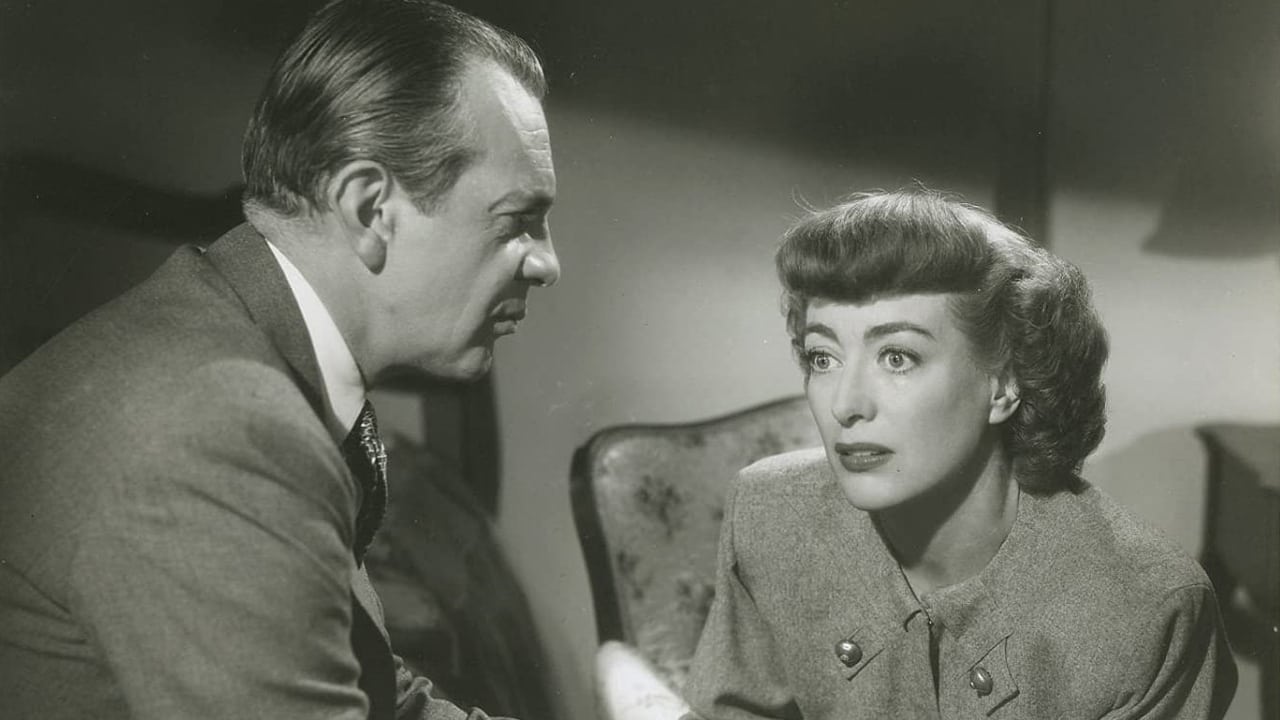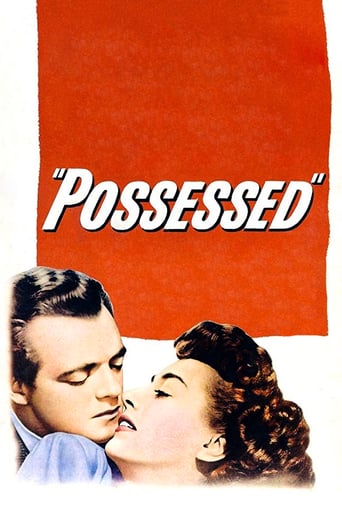Hellen
I like the storyline of this show,it attract me so much
EssenceStory
Well Deserved Praise
Lightdeossk
Captivating movie !
Whitech
It is not only a funny movie, but it allows a great amount of joy for anyone who watches it.
lasttimeisaw
A Joan Crawford's star-vehicle directed by German émigré Curtis Bernhardt, in POSSESSED (not the namesake film Crawford made in 1931 with Clark Gable), Crawford plays Louise Howell, an erotomaniac possessed by her desire over David Sutton (Heflin), an engineer who cannot reciprocate her with the same obsession.The film opens with a frazzled Louise roaming in the streets of Los Angeles, unable to utter another word besides "David!", she succumbs to a stupor and is taken to the hospital, under the treatment of Dr. Willard (Ridges), she lets up her stories in flashback from the falling-out between her and David, he considers her as a mere intermezzo in his life, yet she contends to be his theme song (aka, Schumann's Carnaval, Op. 9 piano solo), the music cue plays a significant role in the later stage which compounds Louise's descent into psychosis. A trained nurse hired to minister to the invalid wife of the wealthy industrialist Dean Graham (Massey, a salt-of-the-earth ilk but also mulish enough to seek the impossible) and after a horrific event crops up near the family's lake house, leaving Dean a widower, Louise choose to stay on with the Graham family in Washington D.C. on the strength of seeing David again, since Dean is his boss. When David reappears in her life, Louise goes all out to reignite their romance, but the latter is completely out of love with her, humiliated and disillusioned, she accepts Dean's marriage proposal in spite of both twig that she isn't in love with him. Loveless-but-affluent marriage usually functions well for most people, but Louise receives a bolt from the blue when she finds out David and her step-daughter Carol (a debutante Brooks) have become an item, which is the tipping point driving her into further hallucination where reality and unreality has blurred their finitude. Two murderous occurrences are confected, only one transpires to be veridical (the other sending up its blasé staircase confrontation trope), but the ending, nevertheless, ladles out enough psychobabble to augur everything will be fine for the misfortune-ridden Lousie. Nabbing her second Oscar nomination, Ms. Crawford makes for a barnstorming presence, histrionic occasionally, but speaking of a tarnished soul desperately hanging on her tapering pride, she is magnificent to behold (decked by jewelry and finery if she sees fit), less savory if she has to play the smitten lover against a miscast Hefin, whose thuggish comportment is a far cry from a mathematic engineer, one basically feels apathetic to his character's comeuppance, and wonders what women see in him is so deadly irresistible? That said, POSSESSED shows up Bernhardt's expressionist flourish in his spooky orchestration that torments Louise's sanity and boosts a strong showcase for its middle-age conscious star, who refuses to be sidelined, neither by the man she yens for nor by the ageist and sexist system, into which she has been sinking her teeth for over two decades starting from its bottom rung.
jacobs-greenwood
Directed by Curtis Bernhardt, and co-written by Ranald MacDougall, this (cutting edge for its time) psychological drama features Crawford's second of three Best Actress Oscar nominated performances, and second of three pairings with writer MacDougall (she'd won for Mildred Pierce two years earlier). Crawford plays a disturbed woman who shows up in an unfamiliar city muttering names and words with no discernible meaning until a psychiatrist is able to uncover their origins using patience and drug treatment. The story he uncovers, during flashback storytelling, is this:Crawford was a nurse for a wealthy family that was also secretly in love with a confirmed bachelor, "in love with his work, and himself" engineer named David, played by Van Heflin (it's a mystery to me what women ever saw in this actor), who lives across the lake from the family's vacation home. Mrs. Graham is the invalid, confined to a wheelchair, to which Crawford's character Louise attends. David tires of Louise's overbearing possessive love and breaks off their affair. A distraught Louise returns to the Grahams and is chastised by Mr. Graham, Dean (Raymond Massey), for being absent, but she explains that it was her day off before she goes to attend to Mrs. Graham. An accident or a murder, it's intentionally a mystery, occurs causing Mrs. Graham to drown in the lake. The Grahams twenty- one year old daughter Carol (Geraldine Brooks) & preteen son return while an inquiry, by the coroner and Lieutenant Harker (John Ridgely), determines it was an accidental death.Dean hires David, then later falls for Louise, though she still loves David. Not knowing this, Dean still accepts Louise's respect for him as enough, hoping that will eventually grow into love. Dean marries Louise causing resentment from Carol who, not only blames Louise for her mother's death, but thinks she's a gold digger. However, Louise is able to smooth it over and the two become friends until Carol starts dating David, despite Louise's cautions. With the stress of it all, Louise's psychological condition deteriorates and she starts imagining things. As a former nurse, she has some realization of what is happening and goes to see a doctor, who confirms her diagnosis.Without giving away what happens next, or the ending, suffice it to say that Crawford gives a terrifically credible performance of a mentally unbalanced woman who goes over the edge.The various doctors are played by Stanley Ridges, Moroni Olsen, and Erskine Sanford.
seymourblack-1
This story of romantic obsession, mental breakdown and murder provided Joan Crawford with one of the most memorable and successful movies of her career and an Oscar nomination for Best Actress (1947). Her portrayal of a woman who loses touch with reality, experiences hallucinations and mistakenly believes that she's responsible for the deaths of two people is powerful and convincing, especially as the audience sees so much of what's happening through her eyes. German expressionist compositions provide a fitting backdrop to the action and contribute strongly to the atmosphere, which is often moody and tense.When Louise Howell (Joan Crawford) is admitted to a hospital, she's initially unresponsive and her condition is assessed by a psychiatrist who later uses drug therapy to find out what circumstances led to such a dramatic deterioration of her mental state. It's soon revealed that Louise had been deeply in love with a construction engineer called David Sutton (Van Heflin) who tired of her possessiveness and decided to end their relationship. Shortly after, David had left to work in Canada.Louise continued to work as a nurse caring for the bedridden wife of a wealthy oil man called Dean Graham (Raymond Massey) and a little while later, tragedy struck when Mrs Graham was found drowned in the lake near to the Graham residence. Louise continued her employment with Dean and became the governess for his young son Wynn (Gerald Perreau) but her relationship with Dean's twenty year old daughter Carol (Geraldine Brooks) became difficult after she accused Louise of being her father's mistress.When David returned to work on a project with Dean, Louise had tried to revive their relationship but was given the brush off and soon after married Dean. The anguish that she'd experienced over David and the feelings of guilt she'd had about Mrs Graham's death increased even further when Carol and David became romantically involved and the pace of her mental deterioration accelerated dramatically."Possessed" is a fine psychological melodrama, which features good acting performances and exploits the great interest in Freudian themes which was widespread in the 1940s. The nature of the plot and Joan Crawford's intensity make this movie absolutely riveting throughout.
sandra small
Brorrowing from the docufilm; The Celluloid Closet (1995) permits the viewer to focus on Possessed (1947) from a perspective which is the main point of the film. To explain further, The Celluloid Closet (1995) points out that the Hays Code (1930 - 1968) endeavoured to regulate morality. As such the Hays Code's purpose as a guide, leads the viewer's interpretation of the film. This has culminated in a narrow, one dimensional way of looking at film as in the case of Possessed.Accordingly, this has culminated in many consumers of this film to focus on the chief character Louise Howell (Joan Crawford). This has distracted the viewer from the bigger picture which is that of the ignorance pertaining to mental illness at that time. The ignorance is apparent when Howell's husband Dean Graham (Raymond Massey), ex-lover David Sutton (Van Heflin) and step daughter, Carol Graham (Gereldine Brooks) are oblivious to Cowell's breakdown which is in fact symptomatic of schizophrenia.Pointedly, when making his diagnoses Cowell's physician's approach to the condition is indirect. It is by skirting around the subject, Howell's physician deviates from having to use the word 'schizophrenia'. This prompts a reaction by Howell and as such she doesn't suffer fools by telling the doctor that she knows that he is diagnosing schizophrenia. She then went on to describe herself as 'crazy'. This negative stereotype of mental illnesses such as schizophrenia is not only a cause of ignorance, but moreover fuel's ignorance.Indeed the film's subtext is to convey a message to the Hay's Code and how it's prohibition on certain subject matters fuels ignorance. Such ignorance climax is tragedy as Possessed shows.An excellent marketing commodity, Crawford's VIP celebrity status permits a focus on her calibre as a star and actor. By focusing on Crawford too much the viewer overlooks the bigger picture of Possessed. Moreover the film becomes more of a tool to buttress Crawford's acting status which, as has been well documented, was vital to her vocation just prior to her Oscar win for Mildred Pierce (1945) when apparently her career as an Hollywood actor at MGM was on the slide.Warner Brothers who produced Mildred Pirce and Possessed utilised the Crawford MGM had forged, (for example see her in MGM's Grand Hotel 1932) which was the archetypal film star and turned her into a bona fide credible actor , which were acknowledged by her Oscar win and subsequent nomination for each film respectively. From here on in Crawford's film career took on a new direction.While the supporting cast in Possessed is credible their acting did not convey the depth of ignorance to mental illness as convincing as could have been. As to Crawford's acting she being a histrionic actor placed this film's genre as a hybrid of soapy nior. An example can be viewed in one scene when Howell pushes (albeit accidentally) step daughter Carol Graham down the stairs which turns out to be a hallucination, which is a prominent symptom of schizophrenia. Where the cast lack in their endeavours to highlight the ignorance pertaining to mental illness the director Curis Burnhadt makes up for this by utilising audio affects. This method serves as a tool to maximise and covey Howell's hallucinatory state. In sum this film is a recommended portrayal of the ignorance pertaining to mental illness. This is conveyed as a message to the Hay's Code enforcers that they were responsible for fuelling such ignorance. For that endeavour Kudos goes to director Curtis Burnhartd.

